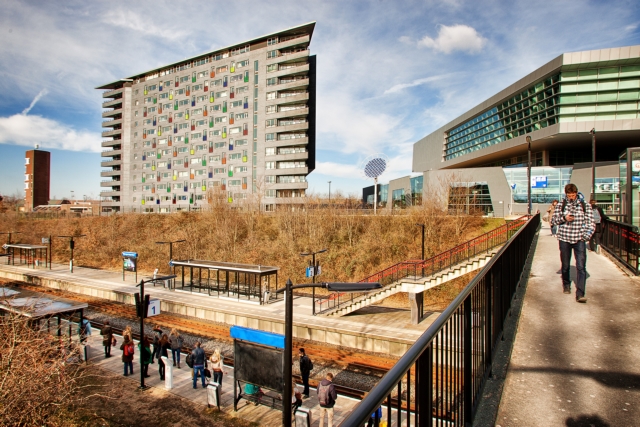Internationals who want to leave SSH& Rooms early can sub-let
-
 On the left is SSH& complex De Gouverneur. Photo by Dick van Aalst.
On the left is SSH& complex De Gouverneur. Photo by Dick van Aalst.
Going forward, international students can sub-let their rooms if they want to move before the end of their rental period. With this new measure, student housing company SSH& hopes to alleviate some of the pressure on the student housing market and prevent unnecessary vacancies.
According to the current rules, international students can only leave furnished SSH& rooms on two occasions: after six months or after one year. If they move away before then, they are forced to pay double rent for a while. This is a waste of money, but also a waste of a room, which remains vacant for the duration. At the same time the students have to compete for living space in Nijmegen with soon-to-be first years.
Several international students have already sounded the alarm with Vox regarding this issue. Additionally, the PvdA (Labour Party) asked council questions in the Nijmegen municipal council. This was the reason for the SSH& to start talks with Radboud University and the HAN, according to Marco Schoofs, Strategy & Living manager at SSH&. ‘It really is a pressing issue. The current situation these students find themselves in is very undesirable. And unnecessary vacancies due to someone paying double rent is societally unjustifiable.’
Own responsibility
As a result, SSH& wants to offer more flexibility to those internationals who want to leave their room early. This would concern bachelor- and masters’ students following a multi-year programme. From now on, they can sub-let their living space to other students, for the remainder of the let. All they have to do is report to SSH& to whom they will be sub-letting their room. They will still be held responsible for the room and the monthly rent. Additionally, the sub-letter must belong to SSH&’s target demographic.
Right now, there are around 1150 students with a year contract with SSH&. Schoofs expects that roughly half of them will make use of the new regulation. Sub-letting will also be possible during the next academic year, but only starting in January. Students with a half year contract for the first semester will have to sit it out.
Risk of vacancy
However, the seemingly simple solution of allowing students to cancel their contracts early proves to be impossible. Schoofs: ‘In that case we would assume the risk of vacancy, which we don’t want to do.’ If there are only a few months left on the rental agreement, it is very hard to find someone else. ‘And we are contractually obligated to the educational institutions to have the rooms available to a new group of students.’
‘This is a step in the right direction’
Mika Kraft, party follower for the PvdA Nijmegen, says the measure is a step in the right direction. ‘International students with a short-stay contract are completely stuck right now; if they could sub-let, that would be some improvement.’ However, he would prefer that students be able to cancel their contract earlier. ‘It is already difficult enough for internationals to find a room – many advertisements for rooms state “no internationals”. I would prefer to see the SSH& take on the task of finding a new tenant themselves. It should be very little trouble for them.’
The fact that the SSH& does not want to take on that task themselves, is partially because the issues arose through no fault of their own, according to manager Schoofs. ‘The rooms with one-year contracts were originally intended for international students who would only be staying in Nijmegen for a year (such as via an exchange programme like Erasmus, ed.). Over time, these rooms were also used by internationals who came to study for multiple years.’ According to Schoofs, this has to do with the fact that the University and the HAN wanted to offer these students suitable living space as well.
Long Term
In the long term the SSH&, together with the university and the HAN, is looking into whether or not they can split these two groups. The municipal council and the PvdA are also involved in the process. Schoofs: ‘We may have to start offering different rooms to international students who want to stay in Nijmegen for more than a year.’ They could get a different type of contract, as well as a different kind of room – unfurnished, for example. ‘If you’re renting for a longer period of time, you’re more inclined to want to set it up yourself.’



